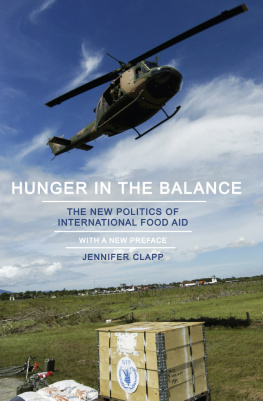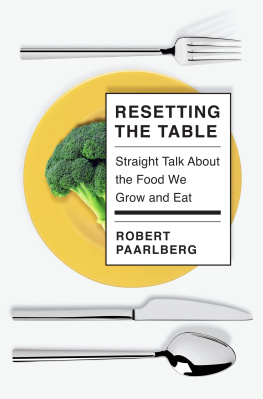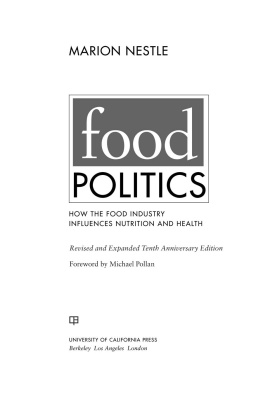Paarlberg - Food Politics
Here you can read online Paarlberg - Food Politics full text of the book (entire story) in english for free. Download pdf and epub, get meaning, cover and reviews about this ebook. City: USA;Oxford, year: 2013, publisher: Oxford University Press, genre: Politics. Description of the work, (preface) as well as reviews are available. Best literature library LitArk.com created for fans of good reading and offers a wide selection of genres:
Romance novel
Science fiction
Adventure
Detective
Science
History
Home and family
Prose
Art
Politics
Computer
Non-fiction
Religion
Business
Children
Humor
Choose a favorite category and find really read worthwhile books. Enjoy immersion in the world of imagination, feel the emotions of the characters or learn something new for yourself, make an fascinating discovery.

Food Politics: summary, description and annotation
We offer to read an annotation, description, summary or preface (depends on what the author of the book "Food Politics" wrote himself). If you haven't found the necessary information about the book — write in the comments, we will try to find it.
Food Politics — read online for free the complete book (whole text) full work
Below is the text of the book, divided by pages. System saving the place of the last page read, allows you to conveniently read the book "Food Politics" online for free, without having to search again every time where you left off. Put a bookmark, and you can go to the page where you finished reading at any time.
Font size:
Interval:
Bookmark:
FOOD POLITICS
WHAT EVERYONE NEEDS TO KNOW
WHAT EVERYONE NEEDS TO KNOW
ROBERT PAARLBERG
Second Edition


Oxford University Press is a department of the University of Oxford.
It furthers the Universitys objective of excellence in research, scholarship, and education by publishing worldwide.
Oxford New York
Auckland Cape Town Dar es Salaam Hong Kong Karachi
Kuala Lumpur Madrid Melbourne Mexico City Nairobi
New Delhi Shanghai Taipei Toronto
With offices in
Argentina Austria Brazil Chile Czech Republic France Greece
Guatemala Hungary Italy Japan Poland Portugal Singapore
South Korea Switzerland Thailand Turkey Ukraine Vietnam
Oxford is a registered trademark of Oxford University Press in the UK and certain other countries.
Published in the United States of America by
Oxford University Press
198 Madison Avenue, New York, NY 10016
Oxford University Press 2013
All rights reserved. No part of this publication may be reproduced, stored in a retrieval system, or transmitted, in any form or by any means, without the prior permission in writing of Oxford University Press, or as expressly permitted by law, by license, or under terms agreed with the appropriate reproduction rights organization. Inquiries concerning reproduction outside the scope of the above should be sent to the Rights Department, Oxford University Press, at the address above.
You must not circulate this work in any other form and you must impose this same condition on any acquirer.
Library of Congress Cataloging-in-Publication Data
Paarlberg, Robert L.
Food politics : what everyone needs to know / Robert Paarlberg.Second
edition.
pages cm
Includes bibliographical references and index.
ISBN 9780199322381 (pbk. : alk. paper)ISBN 9780199322398
(hardcover : alk. paper)
1. Agriculture and state. 2. Food supply.
3. FoodMarketing. 4. Nutrition policy. I. Title.
HD1415.P12 2013
338.19dc23
2013008726
1 3 5 7 9 8 6 4 2
Printed in the United States of America on acid-free paper
I am pleased that Oxford University Press is publishing this second edition of Food Politics: What Everyone Needs to Know. In the fast moving world of food politics, new initiatives and controversies are continuously emerging, so readers will stand to benefit from this updated version of the original 2010 book.
Those familiar with the first edition of Food Politics will notice a number of important additions and changes here. Prominent among these is a new chapter addressing the politics of meat consumption, livestock farming, and fisheries. In the first edition, issues surrounding meat and livestock were scattered throughout the book in a less organized fashion, and the first edition said nothing about fish, a dietary resource of rapidly growing importance. This second edition also provides more discussion of agricultures link to both water and climate change. I offer more about agriculture and the environment in general, including the continuing evolution of agriculture in rich countries toward precision systems that help lessen environmental damage. These systems have emerged rapidly in the commercial production sector, yet precision farming remains underappreciated in political debates. In this second edition I have also added a short concluding chapter on the future of food politics.
It was interesting that the first edition of this book produced some heated food politics of its own. Academic reviewers offered praise for the book, but one predicted that it would drive food activists half-nuts because it challenged some of their deepest orthodoxies. In fulfillment of this prediction, one activist went so far as to organize a prolonged public campaign against the book. No significant factual errors had been found in the first edition, but my critics did find plenty of arguments and conclusions to disagree with. For those interested in my one public response to this campaign, a short letter I published in the Chronicle of Higher Education in April 2012 can be found online. Respectful engagement with critics is part of the duty of scholars, even when a final reconciliation of differences will remain impossible. My approach here is to present the facts, trying at the same time not to ignore or misrepresent the perspective of those who hold different beliefs or draw different conclusions.
Political perspectives are invariably shaped by personal experience. In the first edition of this book I explained that my father was raised on a farm in Indiana, passing along to me an agrarian heritage that I proudly retain. I also mentioned that my concern for rural poverty and undernutrition dates from an early visit I made to India and Nepal, where my brother was serving as a Peace Corps volunteer. I have returned to study and record the evolution of farming in Asia and Africa numerous times since. In this book I try to keep my own personal perspectives in their place, but I cannot pretend they are absent. I take pride in my independence; in my long career as a university-based academic, I have never been funded or employed by any private company. My research has sometimes been funded by private foundations, and sometimes by governmental or intergovernmental agencies, but most often I have turned for research support to the generosity of my home institution, Wellesley College. In my role as a policy expert, I have had occasion to meet with corporate executives, and a decade ago I did agree to participate, alongside other academics and NGO leaders, in a series of external sounding board meetings with scientists and executives from the Monsanto Company, a controversial actor on the food politics landscape, but I asked not to be paid. As for my political leanings, I have always been a registered Democrat. Yet my views on food and farming do not fall neatly into partisan categories. The sections of this book that address food markets and science-based farming are likely to irritate the political Left and please the political Right, but the sections that address food companies, development assistance, climate change, and animal welfare will do the opposite.
In modern societies where few people still work the land as full-time farmers, and where markets offer an ever wider range of choices about what to eat, how to eat, and how much to eat, the politics of food has come to extend far beyond material questions of who gets what, or even Left versus Right. Nor is there a unified academic perspective. Biologists and economists routinely disagree with philosophers, ecologists, and sociologists. Originally trained as a political scientist, I try to remain open to multiple perspectives.
I share with food activists considerable dissatisfaction with todays world of food and farming. Too much of our food is unhealthy, too much of our farming is still unsustainable, and too many of our rural societies remain unjust. Our world of more than 7 billion food consumers (heading toward 10 billion) is still not being adequately or properly fed. I may be less scolding toward the present than some, and less pessimistic about the future, but I concede the value of pessimism, for motivating political systems to act. I offer this updated and revised edition of Food Politics: What Everyone Needs to Know as a new starting point for problem solvers of every stripe, in hopes that it can motivate action as well.
FOOD POLITICS
WHAT EVERYONE NEEDS TO KNOW
Next pageFont size:
Interval:
Bookmark:
Similar books «Food Politics»
Look at similar books to Food Politics. We have selected literature similar in name and meaning in the hope of providing readers with more options to find new, interesting, not yet read works.
Discussion, reviews of the book Food Politics and just readers' own opinions. Leave your comments, write what you think about the work, its meaning or the main characters. Specify what exactly you liked and what you didn't like, and why you think so.



